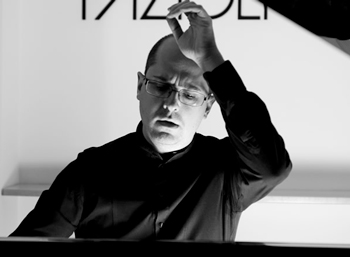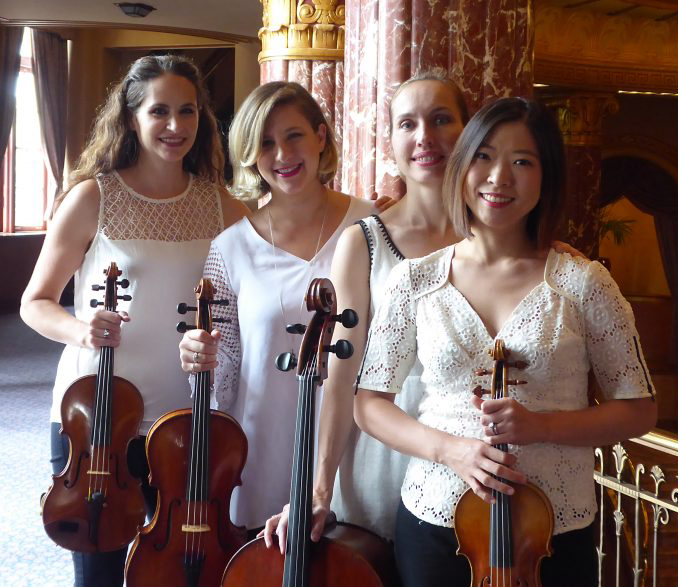by Daniel Hathaway

In addition to playing solo repertoire by Respighi, Liszt, Tárrega, Villa-Lobos, and Ginastera, Plano will join the Omni Quartet (Cleveland Orchestra musicians Amy Lee, Alicia Koelz, Joanna Zakany, and Charles Bernard) to close the evening with Brahms’ f-minor Piano Quintet. Tickets are available online.
When I first interviewed Plano before his Tri-C Classical Piano Series recital in October of 2017, he had recently moved to the U.S. with his wife and three daughters, and had just completed his first year on the faculty at Boston University. In the meantime, he has moved on, joining the faculty of the Jacobs School of Music at Indiana University a year ago. I caught up with him via Skype last Monday in Changshu, China, where he was about to play the final performance of a three-week tour of the country with cellist Darrett Adkins and violinist Laurie Smuckler.
Of course, before talking about his Cleveland program, I had to ask about his Chinese experiences. Who had organized the tour, and what were the halls and audiences like?
“The tour was arranged by Poly Theaters, the biggest company in China that programs major concert halls,” he said, having just returned from a rehearsal at the Changshu Grand Theater. “We’ve played in ten unbelievable theaters around the country, each with more than 2,000 seats, and in some cities I’d never heard of.
“This was my first time touring with a piano trio, but all of us played solo repertoire as well. The audiences were full of children who were not ashamed of making noise. We had to get used to it, but they were very appreciative, and it’s clear that parents want their children to be exposed to classical music.”
In the West, Plano said, people tend to be afraid that children will disrupt the atmosphere of a concert and the concentration of the audience, but he’s entirely in favor of exposing children to the genre at a very young age. “They say that China is the future of classical music, and I got a taste of that. This will be the first of many visits for me.”
Plano was also impressed by the money the government spends on theaters. “The structures are unbelievable. The exterior of one of them is covered with LED lights so you can enjoy huge images of sea life and musicians — the technology is really outstanding.”
The trio were also involved in master classes. “The presenters treated us like rock stars. In one city, eight children played for us just so they could say that they had performed for faculty professors from big schools in America. It’s really interesting to see how they value what we do in the United States. We sold many CDs to parents, and the children all wanted to take pictures of us.”
Plano will change continents just in time to meet the Omni Quartet for the first time and rehearse with them for Saturday’s performance. I asked him to say a few words about his program choices.
“The Brahms Quintet is the juiciest piece on the program,” he said, “and along with the Dvořák, probably the piano quintet I love the best. The piano is really an integral part of the ensemble.” He’s familiar with the piece in more than one way. “I’ve played the two-piano version with my wife, and I’ve played both of the piano parts.”
The Brahms will follow intermission. In the first part of the concert, Plano will play solo works that pay homage both to his roots in Europe and his new home in America — and for the pianist, America is a single continent comprising North, Central, and South.
“I begin with Respighi’s Nocturne, a very romantic piece, and continue with Liszt, the composer I love the most. His ‘Sposalizio,’ the first in his Italian set of pilgrimages, is based on the feelings he had looking at Raphael’s painting of the wedding of the Virgin Mary’s parents, which hangs in Milan.”
As a bridge between continents, Plano has chosen his own arrangement of Tárrega’s solo guitar work Recuerdos de Alhambra, “a Spanish piece with a South American flavor and a touch of Arabic influence.”
Moving below the Equator, Plano will end his solo set with “an interesting mix of popular and innovative music,” including Villa-Lobos’ “Impressões seresteiros” (“Impressions of the Minstrels” from Ciclo Brasileiro), and Ginastera’s Milonga, Op. 3, Canción del Árbol del Olvido, and Suite de danzas criollas, Op. 15.
The pianist noted that this set forms part of a larger program he plays that continues the itinerary to North America and culminates in his own arrangement of Gershwin’s Rhapsody in Blue.
North-south compass points figure importantly in Roberto Plano’s own life as well. “I was born in Varese, north of Milan, but my parents were from the south, from Sicily. You could say I have mixed blood.” His agenda this summer calls for multiple trips back and forth between the U.S. and Italy. “A big part of my life is there — my parents and my brothers — and I’m very happy to still have lots of contacts in Italy.”
Published on ClevelandClassical.com June 4, 2019.
Click here for a printable copy of this article




